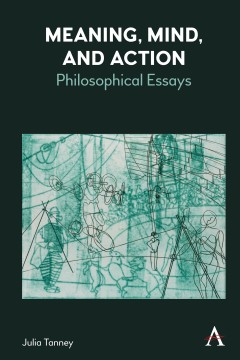Other Formats Available:
E-Book- About This Book
- Reviews
- Author Information
- Series
- Table of Contents
- Links
- Podcasts
About This Book
Julia Tanney’s Meaning, Mind, and Action mounts an overarching challenge to widely held presuppositions within the practice of philosophy in its classical ‘analytic’ forms as well as in its ‘naturalist’ and ‘cognitivist’ turns, expanding upon those introduced in Rules, Reason and Self-Knowledge (2013).
Influenced by arguments of Wittgenstein, Ryle, and others, Tanney confronts the ‘platitudes’ or unalterable starting points that implicitly or explicitly ground mainstream, philosophical theorising, beginning with the ideas first, that the meaning of a complex, natural language expression such as a sentence is determined by its structure and second, that the meaning of its constituents and that such content—which must remain stable across contexts—is needed to accommodate logical transformations (embeddings in, say, negational, conditional, or propositional attitude contexts) and inferential reasoning. Opposing the ideas that this semantic or propositional content is the bearer of truth or falsehood and that to grasp a concept is to be equipped with rules which fix the relation between an expression and its reference or extension, Tanney argues, by contrast, that our practices are logically prior to their codifications. Explanations, justifications, or the appeal to principles, rules, norms are not on the same logical footing as the moves they endorse; in particular, our successful linguistic practices are not causally explained by a prior grasp of ‘meanings’. Further, to appreciate the indefinite elasticity of most, if not all, natural language expressions is to accept that there may be nothing in common by which we call a thing by the same name. Not only does this subvert the idea that the essence of our concepts can be revealed by contextually transcendent application conditions; it undermines the idea that they function to signify facts, properties, events, or relations whose nature is to be revealed by metaphysical or philosophical-scientific speculation. Construing them so would destroy the saying and explanatory power of the expressions subsumed by these concept-nouns in natural language discourses.
Reviews
“Julia Tanney has brought together fourteen of her essays, mostly written in the last decade. They display her usual lucidity and thoughtfulness, as well as her characteristic and admirable determination to swim against the current of the times. Her essays are both provocative and convincing, as well as enjoyable to read.” —Peter Hacker, St John's College Oxford, UK.
“Tanney uses Wittgenstein, Ryle and Austin’s tools to counter strong currents in contemporary analytic philosophy and in a way that should engage those not already in the Wittgenstein camp. Her work takes us where Wittgenstein could have traveled if he were inclined to be more systematic. Penetrating and impressive.” —Professor James C. Klagge, Department of Philosophy, Virginia Tech, USA.
“Julia Tanney brilliantly demonstrates the continued relevance of ordinary language philosophy. Drawing on the fundamental insight that words must be understood in the many contexts of their use, she challenges orthodoxy in, and sheds new light on, such diverse areas as epistemology, the philosophy of action, and the philosophy of mind. This book deserves a wide audience.” —Michael Kremer, Mary R. Morton Distinguished Service Professor, Department of Philosophy, University of Chicago, USA.
Author Information
Formerly Reader in Philosophy of Mind at the University of Kent, Julia Tanney, has been an independent researcher since 2015. Her first volume of essays, Rules, Reason, and Self-Knowledge was published in 2013. Tanney’s work involves critical analyses of the metaphysical ideas and arguments that shape contemporary philosophy of mind, language, action-theory, knowledge, and meta-ethics. She is described as having an insider’s grasp of theory with a depth and comprehensiveness to her arguments that make her criticism impossible to ignore. She is a leading expert on the philosophy of Gilbert Ryle and the later Wittgenstein.
Series
Anthem Studies in Wittgenstein
Table of Contents
Introduction; Part I Meaning and Philosophical Logic; Chapter One, Explaining What We Mean; Chapter Two Rule Following, Intellectualism, and Logical Reasoning: On the Importance of a Type Distinction between Performances and “Propositional Knowledge” of the Norms that Govern Them; Chapter Three, Wittgenstein on Rule Following and Interpretation; Part II Knowing, Action, and Causation, Chapter Four What Knowledge Is Not: Reflections on Some Uses of the Verb “To Know”; Chapter Five, Remarks on the “Thickness” of Action Description; Chapter Six, Prolegomena to a Cartographical Investigation of Cause and Reason; Part III Mind, Consciousness, and Thinking, Chapter Seven, The Location of the Mind; Chapter Eight, Some Absurdities in the Notion of “Conscious Experience”; Chapter Nine, “Ordinary” Consciousness; Chapter Ten, A Peg for Some Thoughts; Part IV The Logic of the Mental, Chapter Eleven, Rational Animals; Chapter Twelve, Investigating Cultures: A Critique of Cognitive Anthropology; Chapter Thirteen “The Colour Flows Back”: Intention and Interpretation in Literature and Everyday Action; Chapter Fourteen Trauma and Belief; Acknowledgments; Provenance of Essays; Index.
Links
Stay Updated
Information
Latest Tweets



